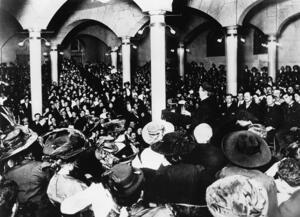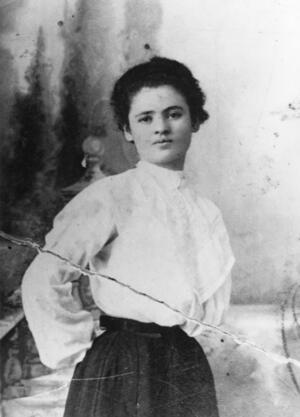Cooper Union
The Great Hall at Cooper Union has been the scene of lively public debate since it opened in 1858. At a mass meeting in November 1909, Clara Lemlich, a 23-year-old Jewish labor organizer who worked in a garment factory on the Lower East Side, gave an impassioned speech in Yiddish, which inspired a general strike of shirtwaist makers. The owners of the Triangle Factory were among a minority of manufacturers who did not agree to the concessions that ended the strike after 11 weeks.

A mass meeting, attended by labor leaders including Samuel Gompers, was held in November 1909 in Cooper Union's Great Hall. It was there that 23-year-old shirtwaist maker Clara Lemlich called for a strike that led to the Uprising of the 20,000.
Courtesy of the International Ladies' Garment Workers' Union Archives, Kheel Center, Cornell University.
In late September of 1909, 150 workers from the Triangle Factory had defied their bosses and attended a union meeting. The owners issued an ultimatum: anyone who joined a union would be fired. The unionists held their ground, and the workers were locked out of the factory. They began picketing as the owners advertised for replacements.
Momentum for a general strike was building through the industry. The International Ladies Garment Workers Union (ILGWU) organized a meeting at Cooper Union’s Great Hall on the evening of November 22nd. The 900-seat, windowless space was packed; those who couldn’t fit in the Hall filled nearby meeting rooms.
One after another, prominent male unionists made their way to the podium to offer encouraging words. None who rose to speak, however, belonged to the group with the most at stake—the immigrant women who made up the majority of the industry's workers. The male leaders of the labor movement doubted that women had the strength for long days on the picket line or the means to survive without even their meager wages, and were not in favor of a strike they were convinced would fail.
After about two hours, a slight young woman interrupted a speaker. "I wanted to say a few words," she said. A cheering crowd helped Clara Lemlich onto the stage. Most people in the Great Hall that night would have known that this young woman was a respected labor organizer, one of the farbrente maydlakh, "the fiery girls" in Yiddish, who dared to strike. Not quite five feet tall, Clara Lemlich had endured harsh treatment for her labor activities. Only recently she had been beaten by hired thugs after she led a walkout at the factory where she worked.
Once on the stage, Clara spoke passionately in Yiddish, transfixing the crowd with her powerful presence: "I have listened to all the speakers. I would not have further patience for talk, as I am one of those who feels and suffers from the things pictured. I move that we go on a general strike!"
As an immigrant woman and garment worker herself, she had been organizing workers for years. In 1906 she had started Local 25, a new chapter of the ILGWU, and had helped lead walkouts in 1907, 1908, and in early 1909.
Clara Lemlich's courage and her ability to rally workers made her a formidable force in the male-dominated labor movement. Looking back at that time in her life, she said "Ah—then I had fire in my mouth! What did I know about trade unionism? Audacity—that was all I had. Audacity!"
Clara Lemlich's audacity ignited the crowd at Cooper Union. Her words struck a cord with the immigrant women in the audience, who were fed up with working conditions in the garment industry where, as Clara described it, "the hissing of the machines [and] the yelling of the foreman, made life unbearable."
At the end of the speech, the workers voted in favor of a general strike, despite the hardships they knew it would bring.
Though most middle-class supporters and many men in the union were opposed to the idea, thousands of women workers, many of them young Jewish immigrants, supported the action, launching the strike that came to be known as the "Uprising of the 20,000."
Fundraising efforts were mounted, including Yiddish plays, silent movies, vaudeville performances, balls, dances, and teas. Non-striking workers were asked to donate half a day's wages to the strike fund. All of these efforts helped, but strikers had to make do on less than $2 per week. And they had to endure abuse from the police and harsh sentences from judges, which in some cases carried jail time. Factory owners even hired prostitutes to taunt the women on the picket line.
The strike ended in February 1910, when the union won concessions from the owners of 279 factories, which employed 15,000 workers: an increase in wages, a 52-hour work week, and "limited required overtime," as well as at least four paid holidays a year, no discrimination against union members, and the right to negotiate with employees.
Within a few years, in the wake of this relatively positive outcome, 85% of workers in the shirtwaist industry had joined the ILGWU. Before the strike, female membership numbered around 3,000. A year later, over 16,000 women were union members.
However, several of the larger factories, including the Triangle, did not recognize the union or agree to its demands. The owners, Max Blanck and Isaac Harris (who were themselves Jewish immigrants who had once labored in the garment trade), gave striking workers their jobs back and increased wages slightly but ignored most of the union's other demands, including improved safety measures such as unlocking doors and installing better fire escapes.
Near the end of the 1909 strike, the Forward wrote that "With blood this name [the Triangle Waist Co.] will be written in the history of the American workers' movement, and with feeling will this history recall the names of the strikers of this shop." This ominous statement was published 15 months before the deadly fire.





